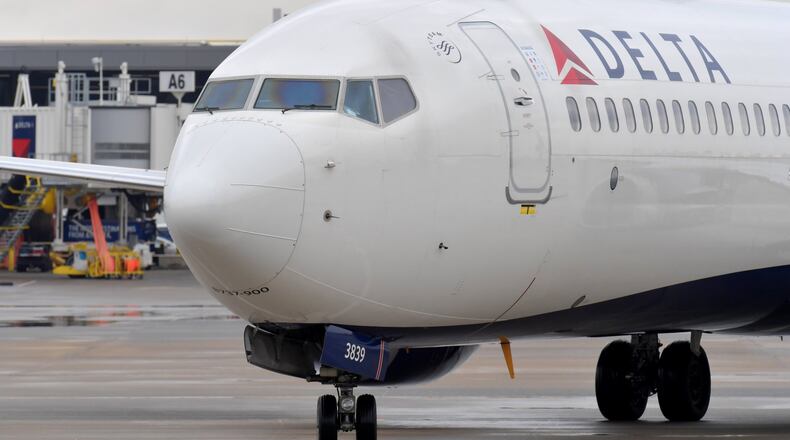Delta Air Lines is staking claim again to a title it lost a decade ago: world’s largest airline.
The Atlanta-based carrier said Tuesday it was No. 1 measured by revenue in 2019 as record financial results capped off a year of low fuel costs and rapid growth.
Delta also got a boost from not having in its fleet the Boeing 737 Max, which was grounded last year after two fatal plane crashes. American, United and Southwest, Delta's three chief domestic rivals, were forced to cancel flights due to the grounding.
In what CEO Ed Bastian called the best year in the company's history, Delta revenue grew 6% to $47 billion in 2019.
Delta was briefly the world’s largest airline following its 2008 acquisition of Northwest Airlines. The title went to United when it merged with Continental in 2010. American took the lead in 2013 when it merged with US Airways.
Several major airlines haven’t reported their year-end results yet, but Delta’s revenue topped the industry through the first nine months and management is confident it maintained its edge through December.
By other measures such as flight capacity, fleet size and employee counts, United or American are still larger.
“It’s far more important to be the best, but if you’re the best and the largest it’s great,” Bastian said in an interview with The Atlanta Journal-Constitution. “Scale matters in this business…I do think it’s sustainable.”
The company’s 90,000 employees are sharing in the good times: Delta said it will pay out a record $1.6 billion in profit sharing to staff on Valentine’s Day. More than 36,000 of those employees are based in Georgia.
The news wasn't all good Tuesday. At least 17 children and six adults complained of minor injuries after a Delta flight reportedly made an emergency fuel dump near a school playground near Los Angeles, according to the L.A. County Fire Department.
Headwinds?
After U.S. airlines went through bankruptcies in the 2000s and then restructured the industry through mergers, many have demonstrated more stable profitability in recent years, prompting hopes that they can escape the financial volatility of the past.
Delta’s net income rose 21% to $4.8 billion in 2019, putting it among the most profitable airlines in the world. The airline’s pre-tax income of $6.2 billion was its best ever.
Bastian said Delta's good operational performance — in areas such as on-time performance and baggage handling — is producing loyal customers and causing more people to choose Delta. A decade-long U.S. economic expansion also hasn't hurt.
"Demand for travel continues to grow faster than anything we've seen over the last few years," Bastian said.
Bastian said he thinks Delta got only a "marginal benefit" from the 737 Max grounding. But it's possible Delta could lose some customers when the 737 Max returns to service and other airlines add flights.
The Max could take to the sky later this year, though investigations by regulators continue and questions arose recently about other problems that could pose risks on the Max. Internal Boeing documents made public last week revealed employees' concerns about the Max while the company evaded scrutiny — further raising concerns in Congress.
Delta also grappled last year with rising costs as it allocated more for employee profit sharing and pensions while quickly scaling up its operations. It struggled to handle a bigger-than-ever summer rush with overtime and other measures.
“These are some costs to help us stay ahead of the growth,” Bastian said.
Meanwhile, Delta is in the middle of difficult labor negotiations with its pilots union, with management recently saying it wants to seek mediation.
Other challenges for Delta include international uncertainty that hurt business in Asia, particularly “with China issues and some of the tariff discussions that bled over into Korea and a few of the other Asian economies,” Bastian said. Delta will also be going through a transition period to shift to different airports in Tokyo and Beijing.
Domestically, the airline is seeing strong growth — particularly as travelers pay more for tickets with perks such as advance seat assignments and ticket flexibility or extra legroom.
Delta President Glen Hauenstein said he has seen that some leisure travelers are "looking for quality and willing to pay higher fares" when the airline upsells them to tickets with more amenities than lower-priced basic economy fares.
Delta by the numbers, 2019
$47 billion in revenue
204 million passengers
90,000 employees
Source: Delta
About the Author
Keep Reading
The Latest
Featured




